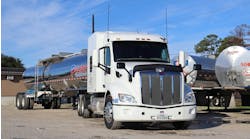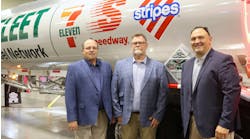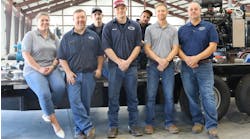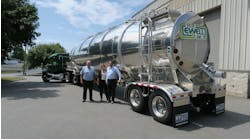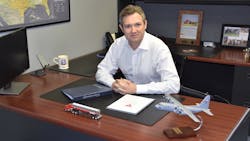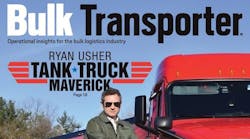Ryan Usher has many titles. One of them is “checklist” guy.
When an item or issue is important, he adds it to the tally, which he always keeps nearby and methodically ticks through in every discussion with Usher Transport’s leadership, to make sure nothing “falls off the table.”
“If you’re organized and prepared, reacting on the fly is easier,” he explained.
The pun, intended or not, is apropos. Usher executives enjoy teasing Ryan about his checklists. CFO David Guess jokes they “shudder” before every meeting. But they understand it’s the same obsessive attention to detail and single-minded dedication to excellence that empower Ryan to excel in deeply demanding, dual roles—president of the family-owned bulk carrier, and proficient pilot in the Air National Guard.
“When you’re flying a C-130, there are a couple of checklist items you’ve got to go through before you leave the ground,” Guess quipped. “So when he’s conducting a management meeting, we joke that we’re going through the preflight check before getting down to business. But the good thing is, when he does that, there’s no mistaking where we are, what our goal is, and what the outcome is going to be.
“He’s that type of guy.”
He’s also a truly appreciative guy, fully realizing he’s only able to pursue both passions through the selfless support of Usher’s experienced leaders, like Guess, COO Eric Mink, and CEO Bill Usher, Jr.—his proud uncle—and his wife Jessica, who holds down the home front while he serves country and company.
“They enable me to do this and I’m so grateful,” Ryan, 38, said.
They’re happy to do so. Thrilled, really. His closest compatriots, brother Patrick Usher, 36, and cousin William Usher, 29, both sales managers, insist he’s ideally suited to usher the fourth-generation company into a challenging new era. But they’re also proud of him for carrying on the family’s tradition of military service, which is ingrained in Kentucky-based Usher’s culture—and willing to work overtime to make both pursuits possible.
“He’s got to be happy,” said Alan Usher, Ryan’s father, who retired in 2014. “If he’s not, it doesn’t work.”
Infinite inspiration
William Amos “Bill” Usher Sr., Bill Jr.’s dad and Ryan’s grandfather, is an infinite source of inspiration for the Usher family, their beloved company—and the entire tank truck industry. But Ryan enjoyed a special bond with the man whose name adorns National Tank Truck Carriers’ Professional Tank Truck Driver of the Year trophy—one forged in the clouds. “He was one of my favorite people in the whole world,” Ryan said.
Bill Sr. served as a fighter pilot in the U.S. Air Force and Air Force Reserves from 1952 to 1962. He racked up more than 14,000 air hours flying F-100s in France and Germany with the 417th tactical fighter squadron, and as an air combat and gunner instructor at Luke AFB in Phoenix, Ariz. As Bill Jr. recalls, his dad only left the service to help his father, Usher founder Harlan Lunsford Usher, build the company because the Air Force wanted to promote him from major to colonel, effectively grounding him. ‘’He said, ‘If I’m going to fly a desk, it’s going to be my own (darn) desk,’” Bill Jr. said.
After he retired from the military, he acquired a Lockheed T-33 Shooting Star, a subsonic jet trainer developed from the F-80, and enjoyed taking his sons and grandsons up in the air. Alan, Bill Jr.’s brother, admits the flights made him dizzy. William called them the “best rollercoaster ride of your life.” Ryan was in heaven. He loved the sensations, the tricks, the view, and couldn’t get enough—of flying, or his hero.
It came so naturally, Ryan earned his pilot’s license before his driver’s license.
Ryan’s grandfather also passed down his passion for service to community and country, and strong sense of integrity—traits ingrained in him by his father, who drove Army ambulances during World War II, and his grandfather, Harlan Vernon Usher, an Army doctor who served in Belgium and France during WWI. Bill Sr. was involved with numerous organizations over the years, helped found the Kentucky Motor Transport Association, served as 1986-87 NTTC chairman, and donated untold time and money to various causes, most of which he never revealed. “I learned a lot when he died (in 2016 at 86 years old),” Bill Jr. said. “But we only know half because he’d say, ‘If you take credit for it, it’s not charity.’”
Now Ryan is following in Bill Sr.’s footsteps, as pilot, president of Usher Transport, and adoring father to two young sons, William Sep Usher, who turns 3 in May, and Parker Alan Usher, who’s almost 1. “I can’t imagine how proud granddad would be if he was still around to see Ryan today,” William said.
Yet Ryan nearly plotted an alternate course—against his grandfather’s wishes.
Uncommon path
Growing up, Ryan and Patrick attended Saint Xavier High School, an all-male, Catholic college prep school in Louisville. Ryan thrived in the strict, uniformed environment, playing multiple sports, before going on to the University of Kentucky, where he played club lacrosse and spent one year in the school’s Reserve Officers’ Training Corps (ROTC). He also played lead guitar in multiple bands, including one called Hundred Dollar Handshake voted best college band in Lexington.
“He’s always been that guy who was juggling tons of things,” Patrick said.
But after graduating from UK, Ryan threw himself into the family business, first in Usher’s Cincinnati operation, and then as a sales manager in their Atlanta office, while relegating his love of flying airplanes to an “expensive hobby” he spent increasingly less time on, though Patrick recalls their grandfather telling his brother to never give it up.
Then the unthinkable happened. Their mom, Amelia Houvouras Usher, tragically was diagnosed with cancer in 2008, leading Ryan to reevaluate his priorities—and flying returned to the top of the list. “That was a pivotal moment for him,” Patrick confided. An equally transformative opportunity soon followed when Ryan discovered the Air National Guard, which offered a path to aviation and military service, while allowing him to remain involved in the family business.
However, joining the Air National Guard, a reserve component of the active-duty Air Force, is easier considered than accomplished. Each state has its own unit, some have more than one—and Ryan tried them all. “I shopped around all over the country trying to figure out where to get hired,” he said. “There’s a standard way, but every unit has their own intricacies, what they want to see, and culturally they’re a little bit different. So I spread the web, and finally got on with Mansfield, Ohio.
“They took a chance on me, so I think a lot of those guys.”
The entire, exhaustive process took two years. Meanwhile, Ryan returned to Louisville to be close to his mom. He finally entered the Air National Guard in August 2012, just before turning 29, the cutoff to begin pilot training. Amelia died shortly thereafter, on Aug. 26, 2012, at age 52—but not before Ryan told her he’d made it.
“It’s an uncommon path to military aviation, so it was challenging to get into, but I figured it out and I’m glad I did,” said Ryan, adding that his mother’s side also has a long and distinguished military history, from an uncle who served in Vietnam to a great grandfather, Charles Hubbard, who was one of the earliest Navy pilots.
Born to fly
Ryan showed he was different on one of his first “check” rides. The training phase covered advanced aerobatics, and after skillfully executing aileron and barrel rolls, a Cuban eight, an Immelmann, a cloverleaf, and more, the instructor called his performance “some of the best aerobatics he’s seen a student perform.” Ryan downplays the feat, but says he felt like “a million bucks” when Bill Sr. told his friends of his grandson’s exploits.
“He was doing that stuff at 13, so it was normal for him,” Alan said.
Ryan went through the Air Force’s fighter/bomber track during active-duty pipeline training, so in addition to the C-130s he hired on to fly, he piloted T-6 Texans and T-38 Talons, which are high-G aircraft that require centrifuge training. “That was intense,” he recalled. When he finished, Bill Sr. pinned on his wings at graduation, then saluted him. “Words can’t describe how much that meant to me,” Ryan said.
He deployed twice before transitioning to “traditional” in the Air National Guard. Both tours were in contested areas of the Middle East, where he spent four months in 2016 and two in 2018, racking up 240 hours of combat flight time while carrying personnel and supplies to forward locations, often with enemy fire all around. “I’ll never forget some of that stuff,” Ryan said. Neither will Patrick. “I couldn’t believe my brother was over there doing that,” he said. “Honestly, I was scared—but also very proud.”
The Air National Guard has federal and state missions. As part of the later, Ryan helped deliver supplies to Puerto Rico after Hurricanes Irma and Maria devastated the island territory in 2017. He now has 1,000 total flight hours, which includes the ongoing training pilots require to stay sharp. “Flying is not the one-weekend-a-month Air National Guard,” Ryan said. “If you’re a pilot, especially air crew, you have to fly regularly. I try to do three or four flights a month, on top of the weekends, so there’s a lot more to it.
“But as a ‘traditional,’ the idea is you still have a primary civilian career.”
'Pilot's pilot'
Ryan “upgraded” to aircraft commander in 2019 with the minimum amount of airtime required. “I was motivated,” he said. “I wanted to be the guy.” He’s now a captain in the Air National Guard stationed in Louisville, but he’s been in the 6.0 training block for the Air Force’s new C-130J Super Hercules since October on a temporary duty travel (TDY) assignment in Little Rock, Ark. He hoped to complete the training in April.
The C-130J is a more powerful aircraft than the model Ryan previously piloted. “The outside of the airplane looks similar, but everything inside is different,” he said. The updated version features digital avionics, including head-up displays for each pilot, and advanced automation, so fewer crew members are required. “It’s more technique based,” Ryan said. “I have all these tools and systems available to me that I didn’t have before, so I have to learn how to interact with them the right way depending on the circumstances.”
C-130 squadrons focus on formation flying and short takeoffs and landings in “austere” locations. Formations allow crews to get “mass on the drop zone” when air dropping supplies for more accurate injections. C-130 pilots must be able to execute assault landings, also called “max-effort procedures,” on underdeveloped dirt runways in all weather conditions. “At night we fly with night-vision goggles,” Ryan said.
And he relishes every minute of it. Beyond the pure joy he felt as a kid, he’s now driven by the challenge, the satisfaction that comes with a well-planned, well-executed mission, and the escape from all other concerns due to the concentration required to operate a military aircraft. “When you’re done, you have a sense of clarity, because you’re so laser-focused on what you’re doing,” Ryan said. “It’s therapeutic in a way.”
Bill Jr. says Ryan’s “a pilot’s pilot.” While all C-130 pilots are highly skilled, Ryan is blessed with elite hand-eye coordination and a good sense for “rate and closure.” He also has above average stick and rudder skills, or “good hands,” which he only concedes because Bill Sr. told him so. Most importantly, he’s honed his situational awareness and decision-making through competition, co-pilot coordination, and endless repetition. “You have to care about being good and taking care of the people around you,” Ryan said. “I love my job, so I care a lot, and I take a lot of time to study and understand it, to make sure I’m good at it.
“Military aviation is a privilege. Not everybody gets to do this. It’s a special career.”
Civilian operation
Fortunately for Usher, Ryan’s pilot training transfers well to specialty trucking.
Bill Jr. suggests he’s more pragmatic and less excitable than many leaders in high-stakes scenarios. “Pilots think differently than other people,” he said. “They’re trained that way.” William’s most impressed by his mindfulness and follow-through, which make supporting him easy. “He commands respect,” William said. Alan says his son is “systematic” and “doesn’t look at all he’s got to do and panic about getting to the end.”
Patrick believes his strict adherence to policy benefits the company. Eric—who made Ryan an administrator of his estate—credits him for helping overhaul Usher’s accounting when he made president in 2017, putting them on firmer financial footing. “Ryan’s always been disciplined, and when he returned (from pilot school), he brought a lot of that training with him, which is why we like him in that leadership role, even though he has to be gone sometimes,” Patrick said.
Guess appreciates Ryan’s unique perspective, which he says ensures company-wide buy-in. When he attacks a problem, he uses every tool at his disposal, including technology and strategies relevant to the moment, and the strategic wisdom gleaned from leaders who preceded him. “When he looks to fix something, he asks the group, ‘This is a great idea, but what does it look like in five years, or 10?’”
Ryan points out he isn’t a CDL-holding driver, but Usher and the Air National Guard both are “transportation companies,” and while aviation leads the way in transportation safety, the tank truck industry isn’t far behind. “I understand, in a way, what it’s like to be an operator in a transportation organization, because I am one,” he said. “So I understand what it’s like to interact with ops back home, if I’m not being properly supported by finance, or don’t understand what the safety guys are talking about.”
He’s currently working on a set of “general knowledge and techniques” similar to the Air Force’s. Rather than by-the-book procedures that could “bog down ops,” he envisions a guide filled with commonly adopted techniques that help users execute a mission or, in Usher’s case, a critical bulk delivery. “If you provide the right amount of knowledge in the right way, it can be really good for your organization,” Ryan said.
The best part, Alan insists, is his son isn’t afraid to try, and learn, new things. “He dives in and figures it out,” he said. That’s why he was the clear choice for president—and future CEO. “He’s the most capable one of us, including me,” Bill Jr. attested. Ryan’s already part owner. With a 1.5% share, he’s the “tiebreaker” for Bill Jr. and Alan.
Essential support
But as good as he is, he couldn’t be president and pilot on his own.
“Fortunately for Ryan he’s got a lot of good people helping him,” said Mink, who’s been with the company for 40 years. Guess, who also serves as chief safety and HR officer, holds multiple doctorate and master’s degrees. Combined, he, Mink, and Bill Jr. boast more than 100 years of industry experience.
Bill Jr., who’s 66, remains involved, in part, to support Ryan’s dream. And, he says, Usher’s well positioned on multiple fronts, enabling Ryan to do what he does. The two-time NTTC safety champion with 235 trucks, a diverse mix of 400 tank trailers, and terminals in Paducah, and Louisville, Kentucky, is growing its rail refueling business with Norfolk Southern, and its Mid America Rail Truck Transfer Systems (MARTTS) division is flourishing. “The company’s been fortunate to have sustained growth in every market we have a footprint in,” Guess said.
Despite raising rates, “dramatically” in some cases, to cover rising operating costs, the company is as stable as it’s been in years. Bill Jr. expects to generate more than $50 million in revenue in 2022. “Ryan’s young, he’s inspired, and the company is at the right size, and in the right place in our development, to give someone like Ryan an opportunity to change things,” Bill Jr. said.
Still, Ryan worries he's spread too thin, and hopes he’s doing right by his family, the company, and brothers in arms in Louisville and Mansfield, who’ve been equally supportive. But Patrick, who helps Ryan’s family as needed, says he’s too hard on himself—and besides, Jessica’s strong enough to carry them all. “I’ve taken on a lot,” Ryan said. “I did it because I wanted to. But it stresses me out, and everybody at home, and she’s really good at helping with that.”
Ryan, in turn, excels at keeping Usher’s entire squad united.
“When we make a decision for the company, he sits with William and I, and we address it as equals,” Patrick said. “He never pulls rank with us. That’s important to keeping everybody happy, and everything good with the family.”
All for one
It’s also the key to keeping Usher in family hands—the most important goal for all.
“The company is exceptional, and I love that part about it,” Ryan said. “We are really good at what we do, and we care a lot about our people. And it’s harder to be that way. It’s more taxing on management. But it makes it a special place. I like that part a lot, and the idea of continuing that, and making it better.” But to do so, and prepare the fifth generation, Ryan knows he’ll one day face the same difficult decision his grandfather confronted 60 years ago—military aviation or tank truck transportation.
Patrick and William want him to keep flying. And while Alan and Bill Jr. might prefer he focus his prodigious talents on ensuring Usher’s success, they’d never ask him to give it up. “It’s what he loves, so I’m not going to tell him no,” Bill Jr. said.
Of course, the proactive planner he is, Ryan already knows what choice he’ll make when that day arrives. As a friend once said, the Air Force can always find another gifted pilot, but the Usher family has only one Ryan Usher.
“I love flying airplanes, but I know what’s most important,” he said.
In the meantime, he’ll continue going through real pre-flight checklists—and leaning on the people around him for ground support. “It’s easy to lead when you have competent, experienced people, and you do it in a collaborative way,” Ryan said.
